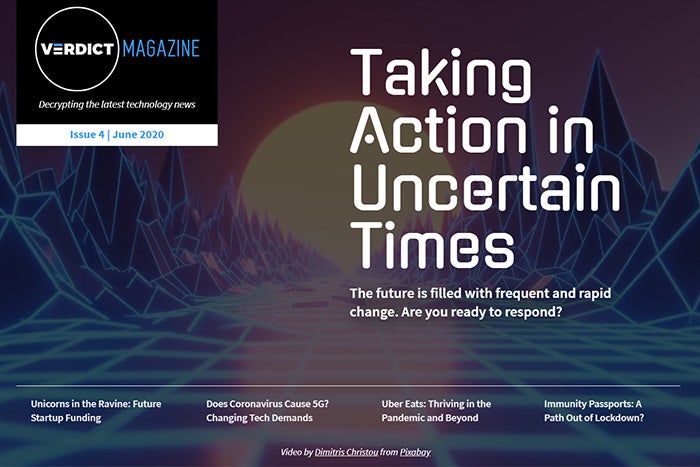
Good morning and welcome to the Tech Report Weekly 20 July. This week in tech it’s a blockbuster week for technology firms publishing their latest earnings; the UK government dissects the pandemic’s impact on digital industries and Microsoft holds its annual Inspire event.
We’ll also be shining the spotlight on data sharing in the wake of the landmark EU-US Privacy Shield Case. What does it mean for businesses, and why might smaller firms be worst off? The Verdict team has also highlighted some of the terrific technology journalism we’ve been reading from around the web, as well as key quotes, news and features from our own reporting. If you’d like all of this sent straight to your inbox every Monday at 7am, subscribe here.

Access deeper industry intelligence
Experience unmatched clarity with a single platform that combines unique data, AI, and human expertise.
Plus, if you haven’t already done so, check out our newly published digital magazine, which this month includes a look at the state of startup funding, the 5G rollout, pandemic security tips, mental health in tech, Slack’s stellar year and much, much more.
Have a fabulous week and we hope you enjoy Tech Report Weekly.
Three things happening in technology this week
Big Tech’s blockbuster earnings week
What’s happening: Microsoft, Tesla, IBM, Intel, Twitter, Snapchat, Verizon and AT&T all publish their latest financial results.
Why it matters: On the whole, the technology sector has proved resilient to the coronavirus pandemic where more traditional industries – such as hospitality and tourism – have been financially crippled. This blockbuster earnings week will give us a view under the bonnet to see how the height of the pandemic has really affected some of the world’s largest technology companies – and their guidance for navigating the second half of the year in this ‘new normal’.

US Tariffs are shifting - will you react or anticipate?
Don’t let policy changes catch you off guard. Stay proactive with real-time data and expert analysis.
By GlobalDataKicking things off on Monday is IBM. The following day Snap, the firm behind messaging app Snapchat, posts its results. On Wednesday Twitter will be hoping for some good news following its recent security woes. That same day Microsoft and Tesla – which recently became the most valuable car company in the world – post their financials. Rounding off the week are Intel and AT&T.
How to follow it: We’ll be keeping an eye out for any earnings surprises and covering the biggest companies throughout the week – visit verdict.co.uk for the latest updates.
Covid’s disruption of digital technology
What’s happening: The UK’s Digital, Culture, Media and Sports Committee holds an evidence session to explore the impact of Covid-19 on digital technologies.
Why it matters: The pandemic has caused sweeping disruption across all sectors. That’s why the DCMS set up an inquiry into the sectors falling under its remit – including digital technologies. The committee’s aim is to establish whether government is doing enough to provide support during these challenging times.
Providing evidence at the hearing are Richard Piggin, head of external affairs at Which?; Felicity Burch, director of innovation and digital, CBI; James Heath, chief executive at the National Infrastructure Commission and Harry Armstrong, head of technology futures at Nesta.
How to watch it: The evidence session can be viewed online at Parliament TV from 9:30am on Tuesday.
Microsoft Inspire goes digital
What’s happening: Tech giant Microsoft holds its annual flagship event, Microsft Inspire.
Why it matters: Microsoft, like most tech companies, relies on maintaining a healthy relationship with its partners – or customers – that use its technologies. Inspire, held each year since 2003, is the tech giant’s opportunity to share its roadmap for the year, teach customers about best practices and show off the latest product innovations.
The pandemic means that this year’s event will take place virtually instead of a conference centre in the US. But that doesn’t mean there won’t be any shortage of Microsoft heavyweights in attendance, including CEO Satya Nadella, president Brad Smith and vice president Gavriella Schuster will all be taking to the virtual stage.
How to watch it: The two-day event can be viewed online by registering here.
From the magazine:
Taking action in uncertain times – Verdict Magazine issue 4 is out now
 The latest Verdict Magazine is out and packed with features, insights and data on how technology is changing the world – particularly in light of the pandemic. From rethinking startup funding to tech’s role in reopening tourism to Covid-19’s impact on 5G rollout, there’s plenty to help keep you informed.
The latest Verdict Magazine is out and packed with features, insights and data on how technology is changing the world – particularly in light of the pandemic. From rethinking startup funding to tech’s role in reopening tourism to Covid-19’s impact on 5G rollout, there’s plenty to help keep you informed.
Spotlight on: Data sharing
Global companies are extremely used to sharing user data across international borders as part of their day-to-day activities. From an operational point of view, it is no different to sharing between two regional offices. There is no alert when data is set across cables bridging nations, continents or trading blocs; nothing to signify that this is any way notable or worthy of additional action.
But under the eyes of the law, it is significant. Data sharing between the EU and the US, for example, has for some time now been a subject of significant contention. Proper handling of user data inside the EU is protected by GDPR: there are limits on what can be done with it, and requirements for how to handle it. And failure to comply can come with severe punishments. But in the US, privacy laws vary significantly between states, and with the possible exception of California, are much weaker than in the EU. In addition, the Snowden revelations have prompted concerns that EU citizen data transferred to the US would be subject to government collection and surveillance.
In a bid to resolve this issue, the EU-US Privacy Shield was developed after the previous framework, the International Safe Harbor Privacy Principles, was thrown out. This enabled companies to self-certify that they were handling data appropriately, including informing users about data processing. However, privacy campaigners, including Austrian Max Schrems argued that it was inadequate to protect EU users’ privacy. This week, that argument has won out, with the European Court of Justice declaring Privacy Shield invalid.
This has left international data sharing in severe disarray, with many companies now unable to legally transfer user data between the US. And while solutions are hastily being developed, it is likely to result in a significant reduction in user data being transferred. Many companies are likely to tweak their practices to handle data in its country or region of origin, while others may realise they never needed to transfer the data in the first place. However, the ruling also creates an alarming new challenge for companies operating in the UK, as following Brexit the nation is likely to be in the same predicament as in the US.
And with many companies used to treating the UK as part of the wider European market, this could pose a more significant and operationally challenging problem. A genuine and complete respect for user privacy remains an unrealised goal, and stricter laws on data sharing are required to realise this. But while the international community looks for a way to resolve the issue, data sharing is set to be a messy and complex problem for companies.
– Lucy Ingham, editor, Verdict
Last week’s highlights:
Industry reacts to the UK’s Huawei 5G ban: From disappointment to relief
Twitter hack: The facts, theories and fallout of the Bitcoin heist
Quote of the week:
“It is all about timing and balance. So, if you want to have no Huawei in the whole of the telecoms infrastructure across the whole of the UK, I think that’s impossible to do in under 10 years.”
– BT chief executive Philip Jansen on removing Huawei technology from the UK’s mobile infrastructure.
What the Verdict team has been reading
Cities Are Becoming Climate Death Traps
In this eye-opening piece for The New Republic, Eric Margolis considered the growing dangers heat waves are posing to urban areas, and the profound implications for our cities.
– Lucy Ingham, editor
China’s health code system shows the cost of controlling coronavirus
A mandatory nationwide system of coloured health QR codes has been rolled out in China as a way of controlling the spread of Covid-19. Wired’s Tautvile Dauelaite examines how this has impacted the country.
– Ellen Daniel, senior reporter
Huawei: Time to ditch UK’s laissez-faire policy to tech takeovers?
The UK banning Huawei from its 5G networks is the symptom of declining home-grown tech companies. The BBC’s Rory Cellan-Jones looks at what’s gone wrong.
– Robert Scammell, deputy editor







